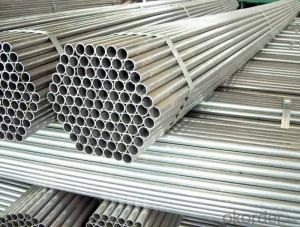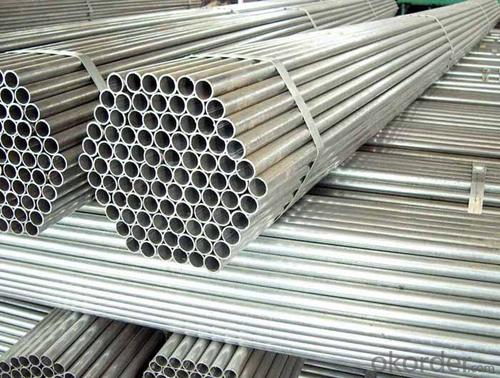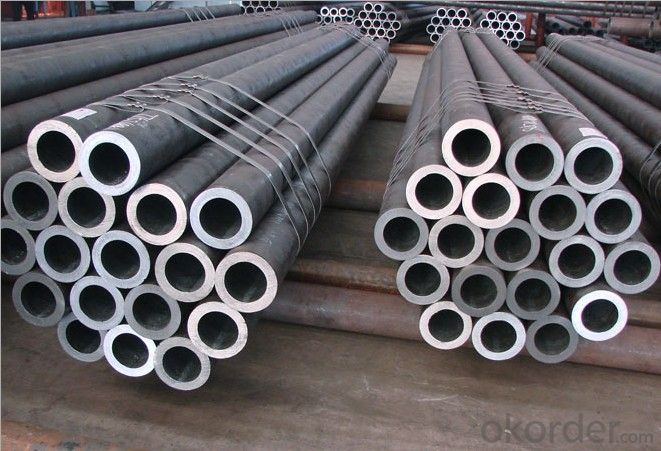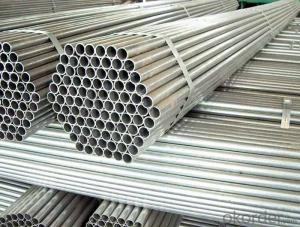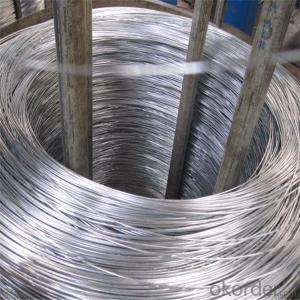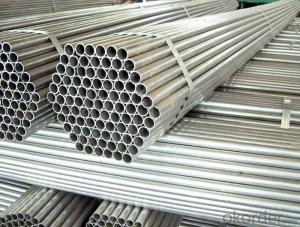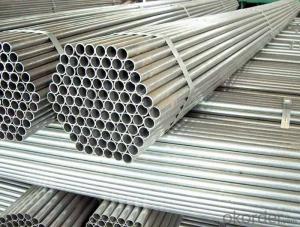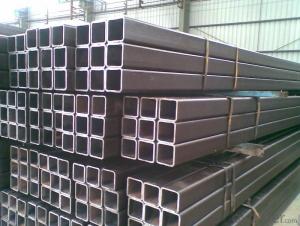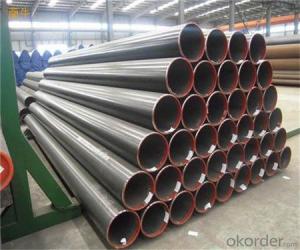Galvanized Steel Pipe BS, JIS, GB, DIN, API
- Loading Port:
- Tianjin
- Payment Terms:
- TT or LC
- Min Order Qty:
- 20 m.t.
- Supply Capability:
- 15000 m.t./month
OKorder Service Pledge
OKorder Financial Service
You Might Also Like
We are company that have many years experience and professional manager team and engineer team and sales team, sure we will provide you high quality of pipe and professioanl service.
Seamless pipe possesses a hollow section and without seam around the strip steel. It is made with solid bar or steel ingot by perforating machine. As the facture process does not include any welding, seamless pipes are considered to be stronger and more durable. Generally speaking, seamless pipe has better pressure resistance and security than other classifications, and was usually more easily available than welded pipe.
2、Main Features of the Seamless Pipe:
• High working accuracy
• High strength
• Small inertia resistance
• Strong therming dissipine ability
• Good appearance
• Reasonble price
3、Seamless Pipe Specification:
Standard | GB, DIN, ASTM ASTM A106-2006, ASTM A53-2007 |
Grade | 10#-45#, 16Mn 10#, 20#, 45#, 16Mn |
Thickness | 8 - 33 mm |
Section Shape | Round |
Outer Diameter | 133 - 219 mm |
Place of Origin | Shandong, China (Mainland) |
Secondary Or Not | Non-secondary |
Application | Hydraulic Pipe |
Technique | Cold Drawn |
Certification | API |
Surface Treatment | factory state or painted black |
Special Pipe | API Pipe |
Alloy Or Not | Non-alloy |
Length | 5-12M |
Outer Diameter | 21.3-610mm |
Grade | 20#, 45#, Q345, API J55, API K55, API L80, API N80, API P110, A53B |
Standard | ASME, ASTM |
1) Material:20#(ASTM A 106/A53 GRB.API5LGRB,GB),45#,16Mn,10#.
2) Specification range: OD: 21.3-610mm, WT:6-70mm, length:6-12m or according to the requirement of clients.
3) Executive standards: GB, ASME API5L.ASTM A 106/A53,Despite of the above standards, we can also supply seamless steel pipe with standard of DIN, JIS, and so on, and also develop new products according to the requirements of our clients!
4) Surface: black lacquered, varnish coating or galvanized.
5) Ends: Beveled or square cut, plastic capped, painted.
6) Packing: bundles wrapped with strong steel strip, seaworthy packing.
4、Packaging & Delivery:
Packaging Details: | seaworthy package, bundles wrapped with strong steel strip |
Delivery Detail: | 15-30days after received 30%TT |
5、FAQ of Seamless Pipe:
①How is the quality of your products?
We have many years business experience in this area, and we have professional engineer and manager team and sure we can provide you high quality production and professional service.
②How about price?
Yes, we are factory and be able to give you lowest price below market one, and we have a policy that “ for saving time and absolutely honest business attitude, we quote as lowest as possible for any customer, and discount can be given according to quantity”,if you like bargain and factory price is not low enough as you think, just don’t waste your time.Please trust the quotation we would give you, it is professional one.
③Why should you chose us?
We can give you both.Additionally, we can also offer professional products inquiry, products knowledge train(for agents), smooth goods delivery, exellent customer solution proposals.Our service formula: good quality+good price+good service=customer’s trust
SGS test is available, customer inspection before shipping is welcome, third party inspection is no problem.
6、Seamless Pipe Images:
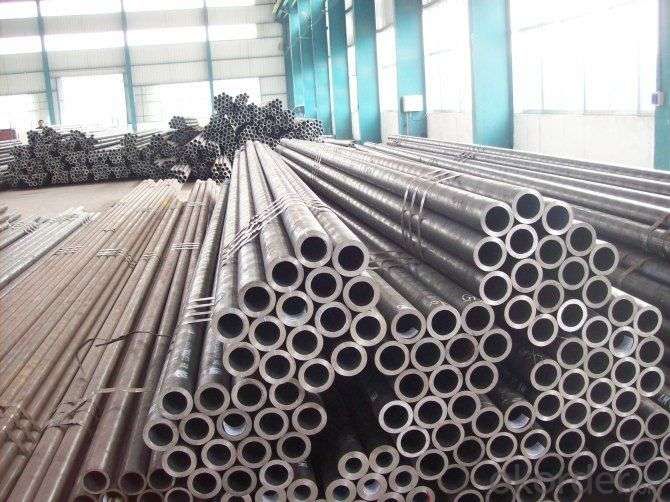
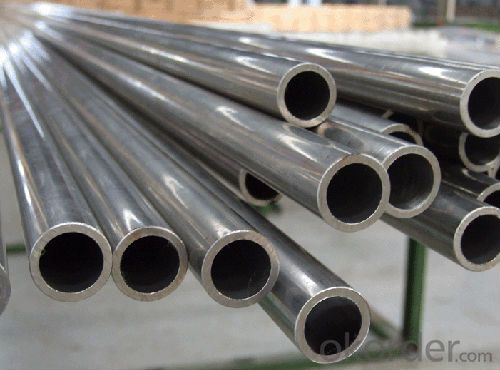
- Q: What are the different types of steel pipe caps?
- There are several different types of steel pipe caps, including threaded caps, socket weld caps, butt weld caps, and flanged caps.
- Q: What are the different methods of inspecting steel pipes?
- There are several methods of inspecting steel pipes, including visual inspection, ultrasonic testing, magnetic particle testing, dye penetrant testing, radiographic testing, and eddy current testing.
- Q: What's the gate number of the precision steel pipe?
- Precision steel pipe refers to the high precision steel pipe, the wall thickness and internal and external diameter can be controlled within 10 wire tolerance range
- Q: How are steel pipes used in the construction of irrigation systems?
- Steel pipes are commonly used in the construction of irrigation systems due to their durability and strength. They are used to transport water from the source to the fields or crops efficiently. Steel pipes can withstand high pressure and are resistant to corrosion, making them ideal for long-term use in irrigation systems. Additionally, their smooth interior surface allows for a smooth flow of water, ensuring efficient water distribution and minimizing the risk of clogs or blockages.
- Q: Can steel pipes be painted or coated?
- Certainly, steel pipes have the capability to undergo painting or coating procedures. It is a prevalent method employed to safeguard them against corrosion, enhance their visual appeal, or comply with particular industry standards. The process consists of an initial step of diligently cleaning the pipes to eliminate any dirt, grease, or rust. Subsequently, a primer is applied, followed by the desired paint or coating. The selection of paint or coating is contingent upon the envisioned purpose of the pipes. For instance, epoxy coatings are frequently utilized for water or wastewater pipelines, while high-temperature resistant coatings are employed for pipes utilized in industrial environments. In conclusion, the act of painting or coating steel pipes has the potential to augment their resilience and overall performance.
- Q: How do you protect steel pipes from fire?
- One way to protect steel pipes from fire is by applying a fire-resistant coating or insulation. This can help prevent the pipes from reaching the critical temperature where structural integrity is compromised. Additionally, installing fire rated enclosures or barriers around the pipes can provide an extra layer of protection. Regular inspections and maintenance are also crucial to ensure any potential fire hazards are identified and addressed promptly.
- Q: How are steel pipes used in the construction of underground utilities?
- Steel pipes are commonly used in the construction of underground utilities as they are highly durable and can withstand the pressure and weight of the surrounding soil. They are primarily used for various applications such as transporting water, natural gas, and sewage, as well as for electrical conduit systems. Additionally, steel pipes are resistant to corrosion, which makes them ideal for long-term underground installations.
- Q: Can steel pipes be painted?
- Yes, steel pipes can be painted. Painting steel pipes provides protection against corrosion, enhances their aesthetic appearance, and can help them blend with the surrounding environment. Prior to painting, the pipes need to be cleaned, primed, and then coated with a suitable paint designed for metal surfaces.
- Q: Is the steel frame on each floor supporting formwork (floor) called full scaffolding?
- The use of scaffold as its height, when the ceiling height below 3.6M, no matter what the ceiling decoration, decorative scaffolding are calculated
- Q: What are the environmental impacts of steel pipe manufacturing?
- The environmental impacts of steel pipe manufacturing include the extraction of raw materials such as iron ore and coal, leading to habitat destruction and increased carbon emissions. The manufacturing process itself involves high energy consumption and releases greenhouse gases, contributing to climate change. Additionally, the disposal of waste materials and chemicals used during production can contaminate soil and water sources if not handled properly. Overall, steel pipe manufacturing has significant environmental implications that need to be addressed through sustainable practices and technologies.
Send your message to us
Galvanized Steel Pipe BS, JIS, GB, DIN, API
- Loading Port:
- Tianjin
- Payment Terms:
- TT or LC
- Min Order Qty:
- 20 m.t.
- Supply Capability:
- 15000 m.t./month
OKorder Service Pledge
OKorder Financial Service
Similar products
Hot products
Hot Searches
Related keywords
